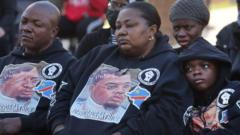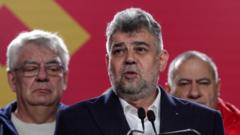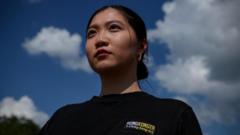**Yoon Suk Yeol’s removal has ignited both jubilation among supporters of democracy and fears about potential unrest.**
**Historic Decision: South Korea's Court Ousts President Yoon Suk Yeol Amid Cheers and Concerns**

**Historic Decision: South Korea's Court Ousts President Yoon Suk Yeol Amid Cheers and Concerns**
**The Constitutional Court's unanimous ruling paves the way for new leadership after a tumultuous impeachment process.**
In a landmark ruling, South Korea's Constitutional Court unanimously upheld the impeachment of President Yoon Suk Yeol on April 3, 2025. This decision marks a pivotal moment in the country’s political landscape, allowing for the election of a new leader after the previous administration's efforts to impose martial law. The court's ruling, which was closely followed by millions on live television, officially removed Yoon from office, a position he had held since a narrow electoral victory in 2022.
Yoon's impeachment resulted from his controversial declaration of martial law on December 3, which was swiftly overturned by the National Assembly. As the acting chief justice delivered the verdict, the mood among supporters and protesters outside the court was palpable. While those favoring Yoon’s removal erupted in spontaneous celebration — hugging, cheering, and waving flags — his supporters expressed dismay and frustration, some booing the announcement near his residence.
“Today marks the beginning of a true South Korea,” declared Lee Jae-myung, the opposition leader and expected front-runner for the upcoming presidential election. Many believe this ruling serves as a restoration of democratic values in the nation, which had faced political unrest and crisis management failures over the past months.
Following the ruling, officials announced that the country would hold a snap election within 60 days to choose a successor to Yoon. Lee Jae-myung has been positioned as a leading candidate, having narrowly lost to Yoon in the last election. However, the future leadership landscape remains uncertain, with no clear front-runner emerging from Yoon’s People Power Party.
The public has demonstrated a mix of jubilation and anxiety; while many are hopeful for a democratic restoration, others express concerns over future political stability. Just hours after the ruling, security measures intensified in anticipation of possible unrest as divisions within the population become increasingly pronounced.
Yoon, facing criminal allegations surrounding his actions related to martial law, expressed regret following his removal but did not comment on the court's decision. His legal troubles are expected to continue, with the potential for serious repercussions including lengthy imprisonment or even life sentences, although opinions on this remain varied within society.
As the nation moves forward with preparations for a new election, the voices from both sides of this political divide resonate, signaling a transformative period in South Korea's democratic journey.
Yoon's impeachment resulted from his controversial declaration of martial law on December 3, which was swiftly overturned by the National Assembly. As the acting chief justice delivered the verdict, the mood among supporters and protesters outside the court was palpable. While those favoring Yoon’s removal erupted in spontaneous celebration — hugging, cheering, and waving flags — his supporters expressed dismay and frustration, some booing the announcement near his residence.
“Today marks the beginning of a true South Korea,” declared Lee Jae-myung, the opposition leader and expected front-runner for the upcoming presidential election. Many believe this ruling serves as a restoration of democratic values in the nation, which had faced political unrest and crisis management failures over the past months.
Following the ruling, officials announced that the country would hold a snap election within 60 days to choose a successor to Yoon. Lee Jae-myung has been positioned as a leading candidate, having narrowly lost to Yoon in the last election. However, the future leadership landscape remains uncertain, with no clear front-runner emerging from Yoon’s People Power Party.
The public has demonstrated a mix of jubilation and anxiety; while many are hopeful for a democratic restoration, others express concerns over future political stability. Just hours after the ruling, security measures intensified in anticipation of possible unrest as divisions within the population become increasingly pronounced.
Yoon, facing criminal allegations surrounding his actions related to martial law, expressed regret following his removal but did not comment on the court's decision. His legal troubles are expected to continue, with the potential for serious repercussions including lengthy imprisonment or even life sentences, although opinions on this remain varied within society.
As the nation moves forward with preparations for a new election, the voices from both sides of this political divide resonate, signaling a transformative period in South Korea's democratic journey.


















